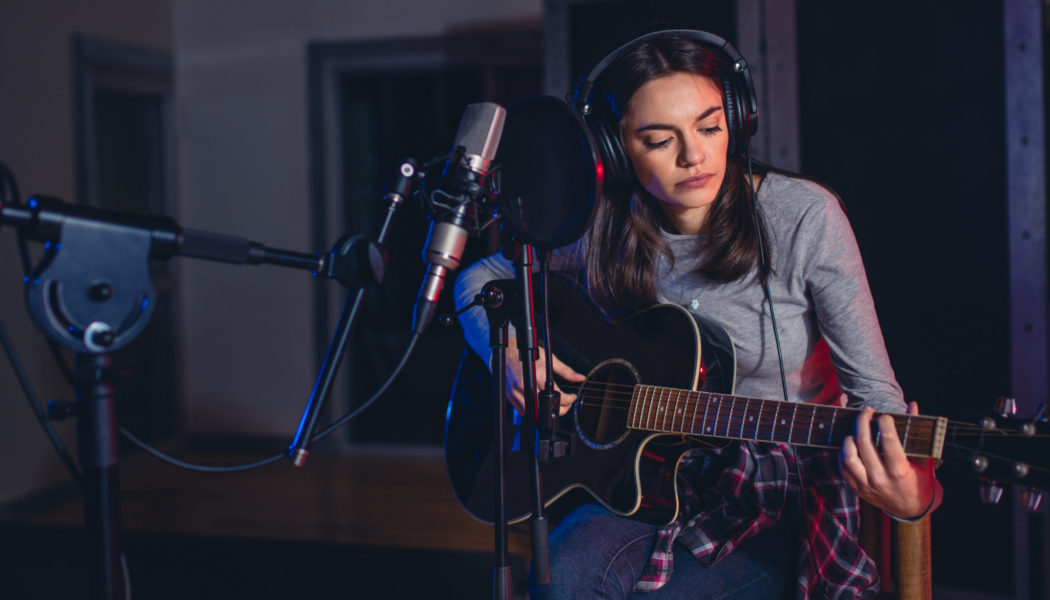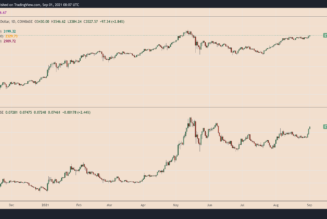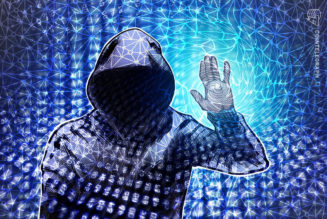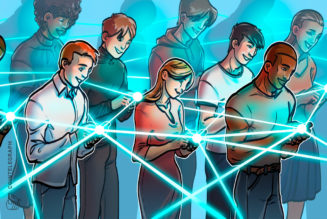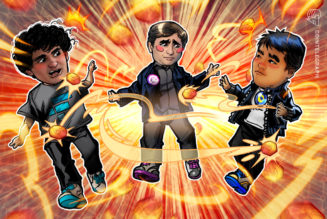At the very start of the pandemic, musicians and producers took to social media to survive, hosting drops and virtual concerts. Platforms like Spotify and Facebook were quick to take notice.
On October 1, 2020, Facebook amended its terms of service and banned artists from using videos to create a ‘music listening experience’. All those who used videos on the platform, including live performances, would see the videos blocked and their pages, profiles, or groups would be deleted.
These guardrails inflicted financial damage on DJs and musicians who relied on platforms like Facebook during the pandemic when live shows were not possible. This especially impacted indie artist, who can now leverage blockchain technology and crypto to catch up and make progress. Music-related NFTs are a promising new way for artists and fans to connect.
According to the RIAA’s lost recent report, streaming accounts for more than four-fifths of music industry revenue. However, 90% of streams are from the top one percent of artists. Spotify’s payouts to artists are far from impressive at an average of $0.004 per stream. Gilligan Moss, a typical indie artist, says his music was streamed around 90,000 times, for which he received an $8.19 check.
With Blockchain streaming platforms and NFTs offering a solution to this long-standing problem in the music industry, we wanted to investigate how much artists could have earned if their music had originally been hosted on a Blockchain streaming site in comparison to regular streaming services. We also spoke with Josh Katz, CEO & Founder of NFT live ticketing and Blockchain collectibles platform company YellowHeart, to gain his perspective on how these new tools could change the future of the music industry.
NFTs can give indie artists a fighting chance
NFTs can give indie artists the possibility of surviving, competing, and performing alongside top artists in the industry. Companies that put their artists and their fans first can not only survive, but thrive well beyond what platforms like Spotify have established as a precedent in the industry. Effectively, the blockchain can help close the gap between artists and fans.
NFTs are unique in that they give listeners ownership of the work. The artist retains copyright and the right to reproduce the work, as with tangible art. Anyone can buy a Mona Lisa replica, but just one entity owns the original.
NFTs benefit artists in that the latter receive a percentage every time someone buys or exchanges their NFT. This way, the artist derives some advantage from the fact that their work is gaining popularity and becoming more valuable. At the very least, there is a chance of this happening, which doesn’t seem possible with regular streaming.
The chasm between regular streaming vs. blockchain royalties
https://infogram.com/streaming-service-comparison-1-1hzj4o3l53zw34p?live
The above infographic compares regular streaming platform royalties as a percentage of what Audius, a fully decentralized streaming platform pays out. As you can see, artists earn an average of $0.34 per stream on Audius. They get just a fraction of that on conventional streaming platforms like Tidal, Napster, Apple Music, and Amazon music. Of these, Napster offers the highest amount – $0.019 per stream – but that’s still about 300x less than what they’d receive from Audius.
Audius has a vibrant community of fans, developers, and artists who share music and collaborate. In simplest terms, it is the blockchain alternative to SoundCloud or Spotify. After artists upload their content on Audius, the platform makes sure the work has been recorded properly by generating timestamps.
Audius connects artists and fans directly, doing away with the need for third-party platforms. Moreover, it uses smart contracts to make sure musicians get fair and prompt payment.
Artists are already using NFTs to their benefit. Mike Shinoda of Linkin Park tweeted:
“Here’s the crazy thing. Even if I upload the full version of the contained song to DSPs worldwide (which I can still do), I would never get even close to $10k, after fees by DSPs, label, marketing, etc.”
The recent NFT sales figures are nothing short of impressive. In March this year, DJ and music producer 3LAU sold music NFTs for $11.6 million in just 24 hours. Canadian musician and Elon Musk’s former partner Grimes made $5.8 million in 20 minutes.
All kinds of musicians can create NFTs to sell different types of digital media. Fans can make payment in Bitcoin, Ethereum, and other cryptocurrencies. Dallas rapper Rakim-Al Jabbaar makes the following prediction about the value of music:
“NFTs will give artists another outlet to create exclusive content for fans in a more artistic fashion. In the future, we’ll see the value of songs appreciate like Basquiat paintings.”
Top artists losing billions from regular streaming
<div class=”infogram-embed” data-id=”39b1bce2-9e71-4c91-98b8-0bb0f903482d” data-type=”interactive” data-title=”Streaming “></div><script>!function(e,i,n,s){var t=”InfogramEmbeds”,d=e.getElementsByTagName(“script”)[0];if(window[t]&&window[t].initialized)window[t].process&&window[t].process();else if(!e.getElementById(n)){var o=e.createElement(“script”);o.async=1,o.id=n,o.src=”https://e.infogram.com/js/dist/embed-loader-min.js”,d.parentNode.insertBefore(o,d)}}(document,0,”infogram-async”);</script><div style=”padding:8px 0;font-family:Arial!important;font-size:13px!important;line-height:15px!important;text-align:center;border-top:1px solid #dadada;margin:0 30px”><a href=”https://infogram.com/39b1bce2-9e71-4c91-98b8-0bb0f903482d” style=”color:#989898!important;text-decoration:none!important;” target=”_blank”>Streaming </a><br><a href=”https://infogram.com” style=”color:#989898!important;text-decoration:none!important;” target=”_blank” rel=”nofollow”>Infogram</a></div>
The above infographic presents Billboard top 100 streamed artists’ average earnings on regular streaming platforms vs Audius. The average earnings across all of the platforms in the previous section were calculated to get the estimated average revenue from regular streaming services. For Audius, the estimation of artists earning $0.35 per stream, cited here, was used.
A look at only the top two artists suffices to get an overall impression of the potential losses. Drake’s average revenue from regular streaming is just under $348 million compared to a potential of $14.7 billion from blockchain streaming services. This yields a loss of $14.3 billion. The second most streamed artist, Ed Sheeran, receives $258 million from regular streaming, whereas he could have earned an estimated $10.9 billion from blockchain streaming, a potential loss of $10.6 billion.
Today, most artists still earn their money from merchandise, social media, and live shows rather than from royalties. Blockchain technology can change this by ensuring equitable royalty payments. Record companies will be able to trace music streams more easily and pay all musicians who contributed to albums and songs immediately. Finally, entertainment venues will be able to reduce the risk of counterfeit tickets.
Final Thoughts
Blockchain’s distributed ledger technology is a way to streamline royalty payments, establish a point of origin for creators of music, cut out costly middlemen, and release music more efficiently. The blockchain and NFTs can transform the way music is sold, managed, produced, and listened to, making these processes fairer, more transparent, more enjoyable, and more profitable for the artists.
Q&A with YellowHeart CEO Josh Katz
We spoke with Josh Katz, CEO & Founder of NFT live ticketing and Blockchain collectibles platform company YellowHeart. Below is a transcript of the interview that focuses on the executive’s thoughts on how NFTs are likely to change the future of the music industry.
Q: What are the key advantages for musicians launching NFT collections?
NFTs can serve a lot of purposes for musicians and the music industry as a whole. Many consumers seem to think that NFTs are little more than unique images and therefore assume that ‘music NFTs’ are just images or visual art ‘connected’ to music.
But NFTs and blockchain tech actually empowers a lot more than just artwork. At YellowHeart, we help musicians release ‘social tokens’ and NFTs that act as ‘keys’ to unlock and grant access not only to content -like unreleased and exclusive album artwork, videos and bonus music tracks- but also to events and real world opportunities.
A fan who holds a piece of an artist’s NFT collection can be granted access to after parties, seat upgrades, or deals with artist sponsors. Beyond exclusive content and dynamic ticketing, it is also looking like NFTs are going to be used to memorialize and track rights for songwriters, publishers and copyright holders.
Q: How do blockchain streaming services benefit artists compared to mainstream services such as Spotify?Do you think these platforms have the potential to replace regular streaming platforms in future?
I am a huge fan of Audius in this space. They pay artists directly, which is something the
music business has needed. It is going to be difficult to dethrone Spotify, Apple and Amazon;
these platforms still have an opportunity to evolve and integrate blockchain and NFTs.
I see a world where Audius grows to be as big as Spotify, but also new decentralized music streaming platforms are constantly being born as well. I am personally waiting for someone to build a decentralized version of SoundCloud.
Q: What are the key advantages of using Blockchain streaming services for fans, if any?
Fans can receive massive utility via blockchain. They say that Web 3.0 is bringing about “The Internet of Value” and the fact is, fans stand to provide value just as much as they may receive value from an artist or content creator.
Blockchain technology may eventually enable a fan’s ‘musical identity’ to travel with them, or to unlock certain online -or real world- access and interactions. Who knows where this might lead when it comes to better, more fulfilling music experiences.
Q: How do you think the music industry is going to adapt to NFTs increasing popularity? Is this something that will become more mainstream for artists releasing music?
NFT will become an additional format. Just like we saw music released on cassettes, CDs and mp3’s, you will see new albums consistently released as NFTs as well. And you don’t see as many artists releasing downloadable mp3s anymore; eventually new formats win out.
At YellowHeart, we have released several albums that were exclusively NFT releases and both the artists and the fans loved it. At this point, I do not see NFTs replacing streaming, but it may augment the experience.
It will be additive and fans who buy the NFT version of an album will receive the best and most interactive (not to mention the most exclusive) music listening experience.
What I am seeing at the moment is, the music industry is still trying to figure out how to use NFTs. There are many smart people in the music industry, but it’s not an industry known for leading technological innovation.
Historically it has been a slow industry to adapt to technology. The record labels and distribution companies did not adapt to web 1 or mobile and got decimated for 20 years. The people running labels today are way too smart to let that happen again.
Also, consumers are driving the adoption of NFTs and more musicians than ever are actively involved in their own career management, album release plans, etc.
We are confident that NFTs and blockchain technology are here to stay and when it comes to what is possible with this technology, the industry is only just getting started; YellowHeart is the only company in North America actively facilitating NFT ticketing and this is only the beginning for that.
Once the key players in the industry get a real taste of what is possible with NFTs and blockchain technology, I believe it will be the biggest shift in music consumption, for both live and recorded music, that the industry has ever seen.
Q: What are some of the other uses of NFTs in the music industry which are showing big potential and why?
Rights management is a massive opportunity that is just starting. Publishing companies will move to blockchain for record keeping and those who don’t, will not survive. Songwriters, artists and producers will simply not want to work with companies that do not use this tech for transparency and payments. NFTs memorialize ownership.
NFTs are trackable and traceable digital assets that can include integrated or ‘automatic’ payment models; this is too perfect of a fit to not eventually provide real, tangible value to the music industry.
Beyond this, there are so many uses. At YellowHeart, we are focused on the interactive side of things; getting fans engaged and creating compelling content and experiences is at the heart of what we do. – At the moment, we really believe in the power of NFT ticketing.
We are confident that an interactive and integrated live event / ticketing experience will ultimately benefit the industry as a whole.
Not only can fans gain access to exclusive digital content by buying and holding an artist’s NFT or token, but if that same artist then uses our NFT ticketing technology at a concert or festival, the fan can receive special treatment or access, discounts, deals or additional event-specific content based on the token(s) that they hold.
One unique thing we have started doing is airdropping exclusive content, deals and downloads to fans as they exit an event.
The digital ticket ‘stub’ can also change colors or evolve somehow after it is scanned or enters a certain geofenced area – not to mention the NFT technology is keeping an immutable record on the blockchain that that one singular fan was at that one specific show. The possibilities are endless and we are just getting started.
